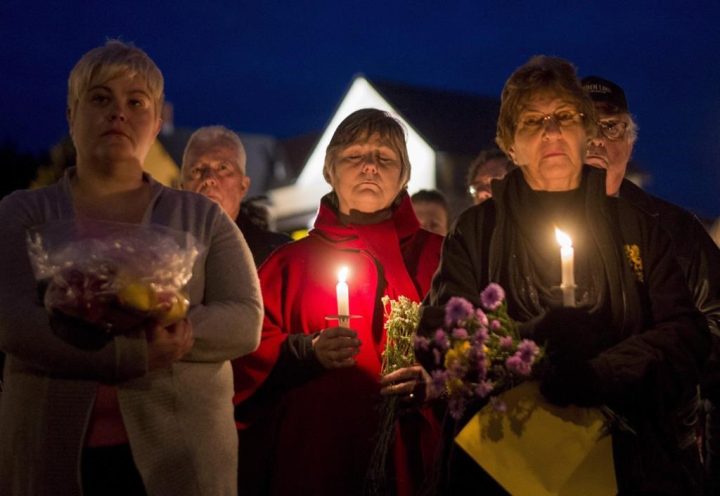A man who killed three of his former partners in eastern Ontario never complied with a court order to participate in a program for those charged with intimate partner violence offences, a coroner’s inquest heard Tuesday.

But just how effective that program would have been for Basil Borutski was unclear, the inquest was told as it considers ways to better protect victims of intimate partner violence, particularly in rural communities.
“To me, he needed something other than (the Partner Assault Response program),” Deborah Kasdorff, the former manager of a victim assistance program, testified at the inquest.
“And I would have been concerned about the other participants in the group with him.”
Borutski, who had a known history of violence against women, killed Carol Culleton, Nathalie Warmerdam and Anastasia Kuzyk on their properties in the Renfrew County area within the span of one hour on Sept. 22, 2015.
Nearly three years before the triple homicide, Borutski pleaded guilty to two counts of uttering threats, mischief and disobeying an order of the court by breaching a peace bond. He also pleaded guilty to assault and assault of a police officer and was sentenced to 150 days in custody and placed on two years of probation.
Under the terms of his probation, Borutski was required to attend and actively participate in the Partner Assault Response program, which aims to give individuals the opportunity to examine their beliefs and attitudes towards intimate partner violence and to learn non-abusive ways of resolving conflict.
The inquest heard that he made excuses about not having transportation to attend the mandatory in-person sessions held in Renfrew County.
Kasdorff suggested that Borutski may not have even been accepted into the program, which is funded by the Ministry of the Attorney General’s Ontario Victim Services.

Get breaking National news
“They’re there to help people that they think they can help and that want the help. And if somebody comes in and won’t accept in any way, shape or form responsibility for anything abusive that they’ve done, I know that the program doesn’t have to accept them,” she said.
Kasdorff noted that as it stands, a new offender may end up in the same sessions as a repeat offender.
“I know from our own domestic violence court advisory committee meetings that we’ve all flagged it doesn’t make sense to have a 19-year-old who’s committed their first offence in the same group as a 57-year-old who’s on his fourth abusive relationship,” she said.
“But, you know, we’ve got one PAR provider (in Renfrew County), and … I don’t know if they’re doing the best they can, but they’ve got limited resources as well.”
Dr. Peter Jaffe, a psychologist and expert on research into violence against women, also told the inquest that the court-ordered program would not have met Borutski’s “extensive needs.”
Last week, Jaffe noted in his review of the case that Borutski was deemed “high risk” in the years before the triple homicide and that he had a long and documented history of extreme violence with intimate partners that spanned decades.
The expert recommended that the Ministry of the Attorney General enhance funding for the program to increase the number of mandatory sessions from 12 to roughly 20 and offer different programming for “complex” offenders like Borutski.
“In my view, you can’t have somebody who’s 40 or 50 years old, as this perpetrator was, somehow get better at 12 sessions,” Jaffe told the inquest last week.
“There needs to be something much more intensive. And there also may need to be parallel programs.”
Jill Dubrick, director of Ontario Victim Services, said she “certainly” understands that different offenders have different needs and stressed that the Ministry of the Attorney General is eager to review the recommendations that come from the inquest.
“We’ve been listening very intently to the experts that have testified to date and there will be others on this as well,” she said.
“We’re certainly looking forward to those recommendations and open to considering what that might look like.”









Comments
Comments closed.
Due to the sensitive and/or legal subject matter of some of the content on globalnews.ca, we reserve the ability to disable comments from time to time.
Please see our Commenting Policy for more.